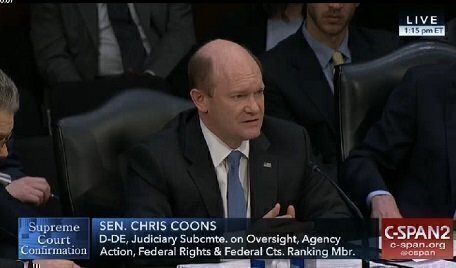Four more Democrats have come out in support of a Senate filibuster of Neil Gorsuch’s nomination to the Court, likely guaranteeing the blocking procedure’s consideration – and demise – in the full Senate on Thursday.
 At first, Dianne Feinstein, Patrick Leahy, and Mark Warner said on Monday they would not vote for cloture, a motion that would limit debate on the full Senate floor about the Gorsuch nomination. Then Chris Coons made a dramatic announcement on Monday afternoon that he would support a filibuster against Gorsuch. Soon after, the Judiciary Committee recommended the Gorsuch nomination, in an 11-9 vote, to be sent to the full Senate.
At first, Dianne Feinstein, Patrick Leahy, and Mark Warner said on Monday they would not vote for cloture, a motion that would limit debate on the full Senate floor about the Gorsuch nomination. Then Chris Coons made a dramatic announcement on Monday afternoon that he would support a filibuster against Gorsuch. Soon after, the Judiciary Committee recommended the Gorsuch nomination, in an 11-9 vote, to be sent to the full Senate.
"I'm not ready to end debate on this issue so I will be voting against cloture unless we are able to finally sit down and find a way to ... fill the next vacancy on the court as not a narrowly agreed but a way for both of us to weigh in and secure support for members of both parties," Coons said. "I hope and pray that we can yet find a way together to find a solution."
Sign up to receive Constitution Weekly, our email roundup of constitutional news and debate, at bit.ly/constitutionweekly
The Coons announcement gave the Democrats 41 committed votes for a filibuster, enough to sustain a vote and force a showdown with Senate Majority Leader Mitch McConnell.
Link: Watch The Video
This weekend, two other key Senators, Jon Tester and Claire McCaskill, said they would join fellow Democrats in supporting a filibuster being mounted by Senate Minority Leader Chuck Schumer.
Senate Majority Leader McConnell needed to get eight Democrats to vote on the cloture motion to end the filibuster with at least 60 votes approving the motion. Five Democrats are up for re-election in 2018 in states that voted heavily for Donald Trump: Joe Donnelly, McCaskill, Tester, Heidi Heitkamp, and Joe Manchin. McConnell, at a minimum, needed those votes and three others.
There are 52 Republicans in the Senate and all are expected to vote to break the filibuster. So far, only three Democrats are expected to vote with the Republicans on the cloture vote: Donnelly, Heitkamp, and Manchin. All three of those Senators have cited concerns about Republicans also voting at a future time to eliminate the filibuster for legislation – a key element in the balance of power within the Senate.
McConnell has indicated that if needed, he will use a procedural move known as the “nuclear option” in the Senate to kill the filibuster process for Supreme Court nominees, leaving just that one filibuster process in place for the Senate for legislative votes.
McConnell had been five votes short of getting the cloture margin he needed. There were five other possible votes that the Majority Leader could get to ride out the cloture vote and he would need all five: Michael Bennet (Colorado), Coons (Delaware), Angus King (Maine), Robert Menendez (New Jersey), and Ben Cardin (Maryland).
Coons' announcement effectively guarantees the filibuster issue will come to a head on Thursday, if not earlier. In 2013, Reid waited until a cloture vote was taken on other judicial nominations before making a Senate rules change.
McConnell repeated this weekend that one way or another, Gorsuch will be confirmed to the Supreme Court this week. “What I’m telling you is that Judge Gorsuch is going to be confirmed. The way in which that occurs is in the hands of the Democratic minority,” he said on “Fox News Sunday.”
Scott Bomboy is the editor in chief of the National Constitution Center.







